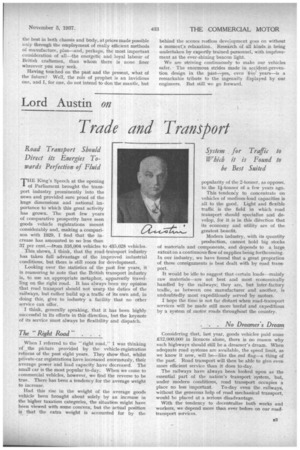Lord Austin on
Page 11

If you've noticed an error in this article please click here to report it so we can fix it.
Trade and Transport
Road Transport ,Vould Direct its Energies Towards Pelfection of Fluid
THE King's Speech at the opening of Parliament brought the transport industry prominently into the news and provided sure proof of the huge dimensions and national importance to which this great activity has grown. The past few years of comparative prosperity have seen goods vehicle registrations mount considerably and, making a comparison with 1929, I find that the increase has amounted to no less than 37 per cent.—from 316,004 vehicles to 435,028 vehicles.
This shows, I think, that the road-transport industry has taken full advantage of the improved industrial conditions, but there is still room for development.
Looking over the statistics of the past few years, it is reassuring to note that the British transport industry is, to use an appropriate metaphor, apparently travelling on the right road. It has always been my opinion that road transport should not usurp the duties of the railways, but rather build up a traffic of its own and, in doing this, give to industry a facility that no other service can offer.
I think, generally speaking, that it has been highly successful in its efforts in this direction, but the keynote of its service must always be flexibility and dispatch.
The "Right Road" .
When I referred to the "right road," I was thinking of the picture provided by the vehicle-registration returns of the past eight years. They show that, whilst private-car registrations have increased enormously, their average power and load capacity have decreased. The small car is the most popular to-day. When we come to commercial vehicles, however, we find the reverse to be true. There has been a tendency for the average weight to increase.
Had this rise in the weight of the average goods vehicle been brought about solely by an increase in the higher taxation categories, the situation might have been viewed with some concern, but the actual position is that the extra weight is accounted for by the popularity of the 2-tonner, as opposer_ to the li-tonner of a few years ago.
This tendenCY to concentrate on vehicles of medium-load capacities is all to the good. Light and flexible traffic is the field in which road transport should specialize and develop, for it is in this direction that its economy and utility are of the greatest benefit.
Modern industry, with its quantity production, cannot hold big stocks of materials and components, and depends to a large extent on a continuous flow of supplies being forthcoming. In our industry, we have found that a great proportion of these consignments is best dealt with by road transport.
It would be idle to suggest that-certain loads—mainly raw materials—are not best and most economically handled by the railways; they are, but inter-factory traffic, as between one manufacturer and another, is undoubtedly most expeditiously served by motors.
I hope the time is not far distant when road-transport services will be made still more `useful and expeditious by a system of motor, roads throughout the country.
. . . No Dreamer s Dream
Considering that, last year, goods vehicles paid some 12,000,000 in licences alone, there is no reason why such highways should still be a dreamer's dream. When adequate road systems are available, the speed limit, as we know it now, will be—like the red flag—a thing of the past. Road transport will then be able to give even more efficient service than it does to-day.
The railways have always been looked upon as the essential part of the natiOn's transport system, but, under modern conditions, road transport occupies a place no less important. To-day even the railways, without the generous help of road mechanical transport, would be placed at a serious disadvantage.
With the tendency to decentralize both works and workers, we depend more than ever before on our roadtransport services.


















































































